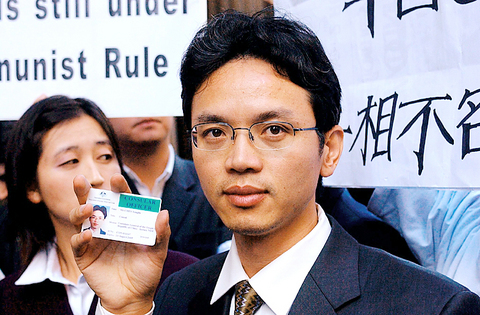A senior Chinese diplomat has sought Australian government protection for himself and his family, claiming he faces persecution if he goes home, Australian officials said yesterday.
Analysts said Chen Yonglin's defection could muddy Canberra's relations with Beijing, its third-largest trading partner with annual exchanges now worth A$28.9 billion (US$22.7 billion).
The Weekend Australian newspaper said Chen, 37-year-old consul for political affairs at China's consulate in Sydney, had applied for political asylum but officials had ruled this out. It said Chen was now seeking a protection visa that would enable him, his wife Jin Ping, 38, and their six-year-old daughter to remain in Australia.

PHOTO:EPA
The newspaper said Chinese consular security staff were searching for Chen, who had walked out of the mission a week ago, saying he could no longer support China's persecution of dissidents.
"They are searching for me. I heard they are looking for me everywhere, especially in the Chinese community," the newspaper quoted him as saying.
A spokeswoman for the Australian Department of Foreign Affairs and Trade (DFAT) said that the government knew of the matter but that it was a case for the Immigration Department.
"We are aware that an official from the Chinese consulate-general in Sydney has applied for a protection visa," she said.
The reported defection comes amid efforts by Australia to forge closer economic ties with China
According to the Weekend Australian, DFAT told Chen, who holds the rank of first secretary, that his request for political asylum had been rejected but that he could apply for a protection visa.
Such a visa would entitle him to remain in Australia permanently.
Despite concerns for his safety, Chen appearing at a rally in Sydney yesterday to mark the Tiananmen Massacre in 1989. He told the rally that about 1,000 Chinese spies are operating in Australia and have carried out several kidnappings. He said he had evidence of several instances in which people were kidnapped and returned to China.
"They have successfully been kidnapping people in Australia back to China," he said.
He said one kidnapping involved the son of an opponent of the Chinese government who had been studying in Australia.
"I told this to the Australian government when the immigration and foreign affairs officials interviewed me on the 31st of May but they don't care," he told the rally.
He said the number of Chinese spies in Australia numbered "some thousand."

Conflict with Taiwan could leave China with “massive economic disruption, catastrophic military losses, significant social unrest, and devastating sanctions,” a US think tank said in a report released on Monday. The German Marshall Fund released a report titled If China Attacks Taiwan: The Consequences for China of “Minor Conflict” and “Major War” Scenarios. The report details the “massive” economic, military, social and international costs to China in the event of a minor conflict or major war with Taiwan, estimating that the Chinese People’s Liberation Army (PLA) could sustain losses of more than half of its active-duty ground forces, including 100,000 troops. Understanding Chinese

The Ministry of Foreign Affairs (MOFA) yesterday said it is closely monitoring developments in Venezuela, and would continue to cooperate with democratic allies and work together for regional and global security, stability, and prosperity. The remarks came after the US on Saturday launched a series of airstrikes in Venezuela and kidnapped Venezuelan President Nicolas Maduro, who was later flown to New York along with his wife. The pair face US charges related to drug trafficking and alleged cooperation with gangs designated as terrorist organizations. Maduro has denied the allegations. The ministry said that it is closely monitoring the political and economic situation

UNRELENTING: China attempted cyberattacks on Taiwan’s critical infrastructure 2.63 million times per day last year, up from 1.23 million in 2023, the NSB said China’s cyberarmy has long engaged in cyberattacks against Taiwan’s critical infrastructure, employing diverse and evolving tactics, the National Security Bureau (NSB) said yesterday, adding that cyberattacks on critical energy infrastructure last year increased 10-fold compared with the previous year. The NSB yesterday released a report titled Analysis on China’s Cyber Threats to Taiwan’s Critical Infrastructure in 2025, outlining the number of cyberattacks, major tactics and hacker groups. Taiwan’s national intelligence community identified a large number of cybersecurity incidents last year, the bureau said in a statement. China’s cyberarmy last year launched an average of 2.63 million intrusion attempts per day targeting Taiwan’s critical

‘SLICING METHOD’: In the event of a blockade, the China Coast Guard would intercept Taiwanese ships while its navy would seek to deter foreign intervention China’s military drills around Taiwan this week signaled potential strategies to cut the nation off from energy supplies and foreign military assistance, a US think tank report said. The Chinese People’s Liberation Army (PLA) conducted what it called “Justice Mission 2025” exercises from Monday to Tuesday in five maritime zones and airspace around Taiwan, calling them a warning to “Taiwanese independence” forces. In a report released on Wednesday, the Institute for the Study of War said the exercises effectively simulated blocking shipping routes to major port cities, including Kaohsiung, Keelung and Hualien. Taiwan would be highly vulnerable under such a blockade, because it